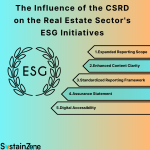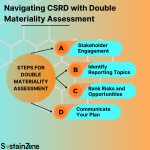Introduction- In previous article, we delved into the impact of the CSRD on the Real Estate Sector’s ESG Initiatives. In this article, we shift our focus to explore the reporting obligations stemming from CSRD and their implications for the Real Estate Sector.
The reporting obligations mandated by the CSRD will be gradually implemented between 2024 and 2028 for the subsequent categories of companies:
| CATEGORY | IMPLEMENTATION DATE | |
| 1. | A substantial enterprise or a controlling entity (whether within the European Union or beyond) that meets the following criteria: It has securities traded on a regulated market within the European Union or is otherwise classified as a ‘public interest entity.’It maintains an average workforce of over 500 employees. | Reporting starting in 2025 for the fiscal year beginning on or after January 1, 2024 |
| 2. | European Union-based substantial businesses and EU controlling entities within significant conglomerates (excluding those falling into category 1) | Commencing reporting in 2026 for the fiscal year that begins on or after January 1, 2025 |
| 3. | Small and medium-sized businesses (excluding micro-enterprises) with securities traded on a regulated market within the European Union | Commencing reporting in 2027 for the fiscal year that begins on or after January 1, 2026 |
| 4. | A non-European Union parent firm within a substantial conglomerate (excluding those categorized as 1 or 3) that fulfils the following conditions: The conglomerate generates a net turnover of over EUR 150 million within the European UnionThe parent company possesses either an in-scope EU subsidiary or a substantial EU branch (with a net turnover exceeding EUR 40 million) within the EU | Commencing reporting in 2029 for the fiscal year beginning on or after January 1, 2028 |
| The term ‘public interest entity,’ as defined in Article 2(1) of the Accounting Directive, encompasses listed European Union businesses, along with certain other particular categories of entities like credit institutions and insurance companies, and entities accorded such status by European Union Member States |
When assessing whether an enterprise falls into the categories of ‘large,’ ‘medium,’ ‘small,’ or ‘micro,’ the Accounting Directive employs the following criteria:
| CRITERIA | MICRO | SMALL | MEDIUM | LARGE |
| Total Assets | ≤ €350 thousand | ≤ €6 million | ≤ €20 million | > €20 million |
| Net Turnover | ≤ €700 thousand | ≤ €12 million | ≤ €40 million | > €40 million |
| Avg. no. of Employees | < 10 | < 50 | < 250 | ≥ 250 |
Even if they are not directly subject to CSRD requirements, numerous companies will still experience indirect impacts, as they will need to furnish various information to CSRD-compliant entities, whether in the capacity of a subsidiary, supplier, or customer.
Impact on the Real Estate Sector
The CSRD will profoundly impact the real estate sector by requiring companies in this field to report on various ESG (Environmental, Social, and Governance) aspects, including energy efficiency, carbon emissions, social responsibility, diversity, and inclusion. Major players such as REITs and developers must disclose their ESG policies, objectives, and performance while ensuring the accuracy of their sustainability reports. This will enhance transparency and comparability of sustainability data across the sector, benefiting investors, regulators, and stakeholders in assessing sustainability risks and opportunities. However, it’s crucial to recognize that the CSRD may also introduce compliance and reporting challenges in the real estate industry.

